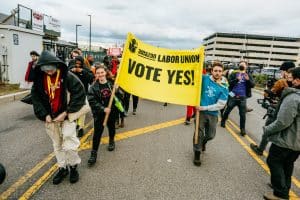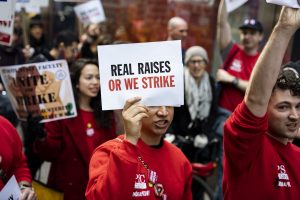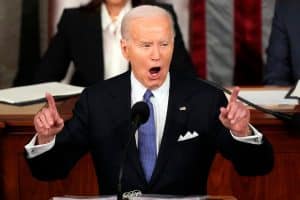Workers in Puerto Rico are planning a national strike and demonstrations today in response to the recent privatization of the island’s power system. These are the biggest strikes on the island since 2019 when workers went on a general strike against former governor Ricardo Rosselló.
Several unions in Puerto Rico made the call for a national strike yesterday during a press conference including the General Union of Workers (UGT), Solidarity Union Movement, Central Federation of Workers Local 481 / UFCW, Puerto Rican Association of University Professors, Puerto Rican Union of Workers, and the Frente Amplio de Camioneros, among others.
Under the call, “Fuera LUMA!” Puerto Ricans are demanding the cancellation of a contract with the private U.S. and Canadian company LUMA Energy. The contract, which went into effect on Tuesday, allows the firm to control and manage Puerto Rico’s electric grid, formerly run by the state agency known as PREPA (Puerto Rico Electric Power Authority).
Puerto Rico’s already neglected electrical grids were further devastated by Hurricane Maria in 2017. In the face of consecutive natural disasters and climate catastrophe, many Puerto Ricans are also demanding a transition away from fossil fuels in addition to the public provision of energy services.
Already protests against the privatization have ramped up over the past week. Unions are warning this summer could be very similar to that of 2019, when the popular uprising against former governor Ricardo Rosselló culminated in a general strike that paralyzed the island’s economy and led to his ousting.
Workers and activists are preparing to block access to the operational offices of PREPA among other actions. A speaker at yesterday’s press conference announced that all options are on the table including: “Stoppages, picket lines, any kind of activity – whatever is necessary, including civil disobedience to stop a contract that is bad for Puerto Rico.”
Two days in, the privatization is already economically affecting Puerto Ricans who suffer from one of the most unreliable electricity systems in the world. Puerto Ricans are also complaining of LUMA’s app which lacks Spanish-language functionality in a country that is predominantly Spanish-speaking.
It’s only been ONE day since Puerto Rico’s electricity grid was forcibly privatized by the United States government and Puerto Ricans are already being billed nefariously.
— paolette (@deviIette) June 2, 2021
Last month: $117
This month: $669
#FueraLuma #FueraLaJunta #FreePuertoRico https://t.co/8gCzT4I0vC
In addition to rising costs, privatization is likely to lead to a loss of jobs among electricity workers. Perhaps the recent disastrous electricity outage in Texas, can shed light on the perils of organizing power for profit. While many froze to death in the middle of the outage, the state’s energy systems continued to channel profits to its body of investors.
Unlike Texans, Puerto Ricans live under a colonial regime, dictated by a U.S. orchestrated Financial Oversight Board (which Puerto Ricans call “la Junta”). The Junta was introduced by the Obama Administration after the passage of the PROMESA Act in 2016 in the midst of the island’s debt crisis.
The seven-person gang of Wall Street insiders that make up the Junta essentially have absolute powers over every aspect of governance within the island and are famously responsible for initiating cuts to healthcare, pensions, and education, in order to guarantee the payment of Puerto Rico’s colossal debts. Last month, the Junta gave their blessing for the contract with LUMA by certifying the contract and the funds needed for the takeover of the electrical grid.
Back in 2019, it was under the context of the Junta’s austerity measures and the cruelly ignorant response to the disaster caused by Hurricane Maria among the U.S. and local government that generated an explosion of anger and a powerful mass movement against Rosselló (an agent of U.S. capital) and the Junta.
The popular uprising called into question the colonial and undemocratic way in which Puerto Rico is governed by a handful of politicians and bankers in D.C. and New York. And after 2019’s general strike and weeks of mobilizations, it became clear that only the workers and poor masses, using their own methods of struggle, can lead Puerto Rico out of its profound crisis.
The struggle against the privatization of PREPA raises again the need for mobilizations and coordinated action against the Junta’s maneuvering, against the payment of Puerto Rico’s strangling debt, and for the complete self-determination of the Puerto Rican people to throw off the yoke of U.S. imperialism. The workers and youth that took to the streets in 2019, and are preparing to take to the streets again, should demand the immediate nationalization, without compensation, of the energy sector. To further protect from imperialist looting and to initiate an immediate transition to renewable energy, these companies should be placed under the democratic control of workers and consumers.
Around the world, workers and oppressed people must show their solidarity with the struggle against Puerto Rico’s colonial debt regime. The workers’ movement and Left in the United States can play an especially crucial role fighting back against U.S. imperialism which administers Puerto Rico’s colonial regime and oppresses others around the world from Puerto Rico to Palestine.











